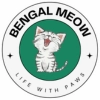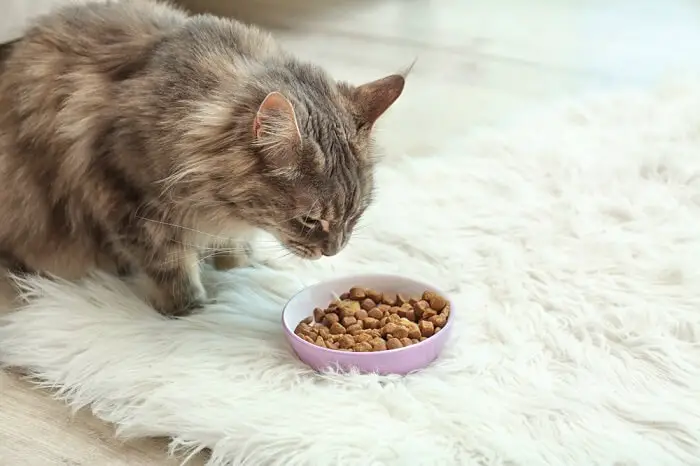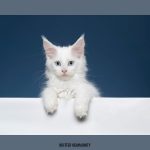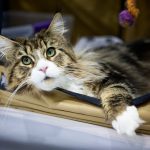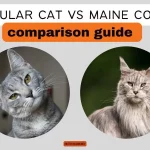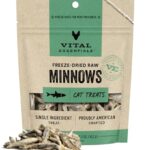What Do Maine Coon Cats Eat: A Guide to Their Dietary Needs
Maine Coon cats eat a combination of meat like chicken and fish, dry cat food, and wet cat food. They need plenty of protein to fuel their play and can consume raw or cooked meat.
Maine Coon cats, known for their large size and energetic nature, have specific dietary needs to support their growth and maintain optimal health. While they are carnivores and primarily eat meat, their diet should include a combination of meat, such as chicken and fish, along with dry and wet cat food.
These majestic felines require ample amounts of protein to sustain their active lifestyle. Whether it is raw or cooked meat, Maine Coon cats benefit from a diet that meets their nutritional requirements. We will explore the specific food choices that cater to the dietary needs of Maine Coon cats, ensuring their overall well-being.
Importance Of A Proper Diet For Maine Coon Cats
Maine Coon cats require a proper diet that consists of high-quality animal protein, such as meat and meat derivatives. While they are primarily carnivores, they can also benefit from a balanced combination of dry and wet cat food, along with occasional supplements like eggs for added protein.
Providing the right nutrition is essential to fuel their energy levels and ensure their overall well-being.
Nutritional Requirements For Maine Coon Cats
Maine Coon cats are known for their large size and playful nature. As such, they have unique nutritional requirements that need to be met through a proper diet. These majestic cats require a high protein diet to support their active lifestyle and maintain their muscle mass. They also need a balanced combination of fats and carbohydrates for energy. Additionally, Maine Coon cats require specific vitamins and minerals to support their overall health and well-being.The Impact Of Diet On Their Overall Health And Well-being
The diet of a Maine Coon cat plays a crucial role in their overall health and well-being. Providing a proper diet with the right balance of nutrients ensures that they receive the necessary building blocks for optimal growth and development. A nutritious diet helps maintain their muscular physique and supports their bone and joint health, reducing the risk of mobility issues as they age. Proper nutrition also contributes to a healthy coat and skin, preventing dryness and promoting optimal coat condition.Ensuring Each H3 Heading Adheres To Html Syntax:
Nutritional Requirements For Maine Coon Cats
Maine Coon cats are known for their large size and playful nature. As such, they have unique nutritional requirements that need to be met through a proper diet. These majestic cats require a high protein diet to support their active lifestyle and maintain their muscle mass. They also need a balanced combination of fats and carbohydrates for energy. Additionally, Maine Coon cats require specific vitamins and minerals to support their overall health and well-being.
The Impact Of Diet On Their Overall Health And Well-being
The diet of a Maine Coon cat plays a crucial role in their overall health and well-being. Providing a proper diet with the right balance of nutrients ensures that they receive the necessary building blocks for optimal growth and development. A nutritious diet helps maintain their muscular physique and supports their bone and joint health, reducing the risk of mobility issues as they age. Proper nutrition also contributes to a healthy coat and skin, preventing dryness and promoting optimal coat condition.
Essential Nutrients For Maine Coon Cats
Maine Coon cats are known for their large size and playful nature. To maintain their health and well-being, it is important to provide them with a balanced and nutritious diet. This means giving them the essential nutrients they need to thrive. Here are some key nutrients that should be included in a Maine Coon cat’s diet:
The Role Of Protein In Their Diet
Protein plays a crucial role in the diet of Maine Coon cats. This is because they are carnivores and their bodies are designed to thrive on animal protein. Protein provides the necessary building blocks for their muscles, organs, and tissues, helping them maintain lean muscle mass and overall strength. Without enough protein in their diet, Maine Coon cats may experience muscle weakness and a compromised immune system.
The Importance Of Amino Acids
Amino acids are the building blocks of protein and play an essential role in the growth and development of Maine Coon cats. There are 20 different amino acids, and each one serves a specific purpose in the body. Some amino acids are considered essential, meaning the body cannot produce them and they must be obtained through diet. Providing Maine Coon cats with a diet rich in high-quality, animal-based protein sources ensures they receive all the essential amino acids they need to thrive.
Essential Vitamins And Minerals For Their Growth And Development
In addition to protein and amino acids, Maine Coon cats require a balance of essential vitamins and minerals to support their growth and development. These nutrients play a crucial role in maintaining healthy bones, teeth, and overall immune function. Some key vitamins and minerals that should be included in their diet include:
- Vitamin A: Promotes good vision and a healthy coat
- Vitamin D: Essential for bone health and calcium absorption
- Vitamin E: Provides antioxidant protection and supports healthy skin
- Calcium: Important for strong bones and teeth
- Phosphorus: Works with calcium to support bone health
- Taurine: Essential for heart health and proper digestion
It is important to note that Maine Coon cats have specific dietary needs due to their size and activity level. Consult with a veterinarian to ensure you are providing them with a diet that meets their individual needs.
Meat: The Foundation Of A Maine Coon’s Diet
Maine Coon cats are known for their large size and energetic nature. To maintain their health and vitality, it is crucial to provide them with a balanced diet that meets their nutritional needs. As carnivores, meat forms the foundation of a Maine Coon’s diet. Let’s explore why Maine Coon cats are carnivores, the types of meat suitable for their diet, and the feeding guidelines for meat-based meals.
Why Maine Coon Cats Are Carnivores
Maine Coon cats are carnivores by nature, which means their bodies are adapted to consume and digest animal protein. Unlike omnivores or herbivores, they lack the necessary enzymes to efficiently break down and utilize nutrients from plant sources. Their biological structure, including sharp teeth and strong jaw muscles, further supports their inclination towards a meat-based diet. Feeding them a diet rich in meat is essential to maintain their overall health and well-being.
Types Of Meat That Are Suitable For Their Diet
When it comes to choosing meat for your Maine Coon cat, it is important to prioritize high-quality animal protein sources. Some suitable options include:
- Chicken: This lean source of protein is easily digestible and contains essential amino acids required for muscle development and maintenance.
- Turkey: Similar to chicken, turkey is a nutritious option that provides a variety of essential nutrients.
- Fish: Maine Coons can also benefit from incorporating fish into their diet. Rich in omega-3 fatty acids, fish supports heart health and promotes healthy skin and coat.
Feeding Guidelines For Meat-based Meals
When feeding your Maine Coon cat meat-based meals, it is important to ensure a proper balance to meet their nutritional requirements. Here are some feeding guidelines to consider:
- Portion Control: Monitor the amount of meat you give your cat to prevent overeating and obesity. The portion size may vary depending on factors such as age, weight, and activity level.
- Meal Frequency: It is recommended to feed your Maine Coon cat two to three smaller meals throughout the day rather than one large meal. This helps prevent digestive issues and keeps their metabolism steady.
- Supplement with Supplements: While meat provides essential nutrients, you may consider supplementing their diet with additional vitamins and minerals to ensure they receive a well-rounded nutrition.
- Observe and Adjust: Monitor your cat’s body condition and overall health closely. If you notice any changes, consult your veterinarian for guidance on adjusting their diet.
Remember, providing a balanced and nutritious diet that includes meat as the foundation is crucial for the optimal health and well-being of your Maine Coon cat. By understanding their carnivorous nature and following proper feeding guidelines, you can ensure they thrive and lead a fulfilling life.

Credit: ruffiansmainecoons.it
Supplementary Foods For Maine Coon Cats
Maine Coon cats primarily eat a combination of meat like chicken and fish, along with dry and wet cat food. They require a diet high in protein to support their large size and energetic play. Raw or cooked meat can also be included as part of their feeding routine.
The Benefits Of Including Dry Cat Food In Their Diet
Including dry cat food in the diet of Maine Coon cats can offer a range of benefits. Dry cat food is specially formulated to provide complete and balanced nutrition for cats, making it a convenient and easy option for pet owners. Here are some benefits of including dry cat food in the diet of Maine Coon cats: 1. Nutritional value: Dry cat food is packed with essential nutrients that are necessary for the overall health and well-being of Maine Coon cats. It contains high-quality proteins, carbohydrates, vitamins, and minerals that support their growth, development, and immune system. 2. Dental health: Chewing dry cat food helps to maintain good dental hygiene in Maine Coon cats. The crunchy texture of dry kibble can help remove plaque and tartar buildup, preventing dental issues such as gum disease and tooth decay. 3. Weight control: Maine Coon cats are prone to obesity, and dry cat food can help in maintaining a healthy weight. It typically has fewer calories compared to wet cat food, which can aid in weight management and prevent excessive weight gain. 4. Convenience: Dry cat food is convenient for pet owners as it can be easily stored, has a longer shelf life, and doesn’t require refrigeration. It can be left out for free-feeding, allowing Maine Coon cats to eat whenever they feel hungry.Choosing The Right Brand And Formula
When it comes to choosing the right brand and formula of dry cat food for Maine Coon cats, it’s essential to consider their specific dietary needs. Here are some factors to consider when selecting dry cat food for Maine Coon cats: 1. Quality ingredients: Look for dry cat food that uses high-quality ingredients, such as real meat as the main protein source. Avoid products that contain artificial additives, fillers, or by-products. 2. Life stage formula: Maine Coon cats have different nutritional needs depending on their age and life stage. Choose a dry cat food formula that is specifically formulated for their life stage, such as kitten formula for growing Maine Coon kittens or adult formula for mature cats. 3. Size of kibble: Maine Coon cats have large jaws and may benefit from larger-sized kibble that encourages chewing. Look for dry cat food with larger kibble sizes or specially formulated for Maine Coon breeds. 4. Veterinarian recommendations: Consult with your veterinarian to get recommendations on the best brand and formula of dry cat food for your Maine Coon cat. They can assess your cat’s specific dietary needs and help you make an informed decision.Guidelines For Feeding Dry Cat Food To Maine Coon Cats
Feeding dry cat food to Maine Coon cats requires following certain guidelines to ensure their nutritional needs are met. Here are some important guidelines to consider: 1. Portion control: Follow the feeding guidelines provided by the manufacturer on the packaging of the dry cat food. Overfeeding can lead to weight gain and obesity, so it’s important to measure the appropriate portion size for your Maine Coon cat based on their age, weight, and activity level. 2. Water availability: Ensure that fresh water is always available for your Maine Coon cat when feeding them dry cat food. Cats have low thirst drives, and consuming enough water is crucial for their overall health and hydration. 3. Transitioning slowly: If you are introducing a new brand or formula of dry cat food, do it gradually to prevent digestive upset. Mix small amounts of the new food with the old food and gradually increase the proportion of the new food over time. 4. Monitoring their health: Keep an eye on your Maine Coon cat’s weight, coat condition, energy levels, and overall health when feeding them dry cat food. If you notice any changes or concerns, consult with your veterinarian to ensure they are receiving adequate nutrition. Incorporating dry cat food into the diet of Maine Coon cats can provide them with essential nutrients, support their dental health, aid in weight control, and offer convenience for pet owners. By choosing the right brand and formula and following feeding guidelines, you can ensure your Maine Coon cat’s nutritional needs are met effectively.Special Considerations For Maine Coon Cats
Maine Coon cats are carnivores and should be fed a diet rich in animal proteins. This can include high-quality dry cat food, wet cat food, and a combination of meats such as chicken and fish. While they don’t require a specialized diet, it’s important to provide them with plenty of protein to fuel their playful nature.
Allergies And Dietary Restrictions
Maine Coon cats, like any other breed, can have allergies and dietary restrictions. It’s important to pay attention to your cat’s reactions to certain foods and make necessary adjustments to their diet. Some Maine Coons may be allergic to certain protein sources or grains, so it’s best to consult with your veterinarian to determine any potential allergies or intolerances your cat might have.The Role Of Treats And Snacks In Their Diet
Treats and snacks can play a role in a Maine Coon cat’s diet, but it’s important to exercise moderation. Maine Coons tend to have a hearty appetite, and it can be tempting to give them treats frequently. However, overfeeding treats can lead to weight gain and other health issues. When choosing treats for your Maine Coons, opt for high-quality, natural options that are specifically formulated for cats. It’s also a good idea to limit the number of treats given per day to avoid overindulgence.Hydration And The Importance Of Providing Fresh Water
Hydration is crucial for Maine Coon cats, as it is for all cats. It’s essential to provide your Maine Coon with fresh, clean water at all times. Maine Coons are known to have a fascination with water, and some may even enjoy drinking from a running faucet or a pet water fountain. This breed has a higher tendency to develop urinary tract issues, so ensuring they have access to plenty of water can help prevent such problems. Additionally, wet food can contribute to their hydration, as it has a higher water content compared to dry food. Overall, understanding the special considerations for Maine Coon cats can help you provide the best diet for your furry friend. By being mindful of allergies and dietary restrictions, moderating treats and snacks, and ensuring proper hydration, you can help your Maine Coon live a healthy and happy life.Frequently Asked Questions For What Do Maine Coon Cats Eat
Can Maine Coons Eat Meat?
Maine Coons are carnivores and can eat meat as a large part of their diet. However, they should also consume a balanced diet that includes other nutrients.
What Meat Should A Maine Coon Eat?
Maine Coons should eat lots of high-quality animal protein. They are carnivores and need meat as a large part of their diet, although not exclusively. They can also eat eggs to supplement their protein intake. Maine Coons are energetic, so they need plenty of protein to fuel their play.
Can Maine Coon Cats Eat Egg?
Maine Coon cats can eat eggs as a supplement to their protein-rich diet. Eggs provide protein and fat, which are beneficial for cats. However, eggs should not be the sole source of protein for cats. They can be fed along with meat and other cat food to ensure a balanced diet.
Conclusion
To ensure your Maine Coon cat thrives, it’s important to provide them with a diet that suits their carnivorous nature. Maine Coon cats primarily eat meat and meat derivatives, but they also benefit from a variety of high-quality protein sources like chicken and fish.
While they don’t require a specialized diet, it’s essential to offer a combination of dry cat food, wet cat food, and raw or cooked meat to meet their nutritional needs. Remember, Maine Coons are active and energetic, so they require plenty of protein to fuel their play.
With a balanced diet, your Maine Coon will stay healthy and happy.
